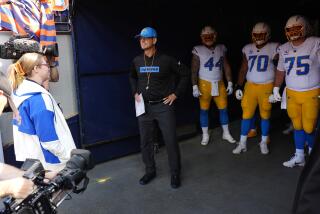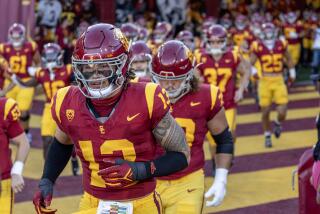DELICATE PROCEDURES : NFL Team Physicians Must Provide Proper Care to Injured Players and Please Management at Same Time
- Share via
When former San Francisco 49er Charlie Krueger recently was awarded $2.36 million in damages related to an old football injury, it merely emphasized what many ex-National Football League players have suggested for decades: that a conflict of interest may exist between a team’s management and the doctors it retains to care for its players.
In a sense, there are few more delicate relationships in the NFL than the one involving an injured player, a coaching staff paid to produce wins, a front office looking to reap the most from its investment, and a team doctor.
Consider the pressures: not only must the doctor properly diagnose the injury, he must then find a way to treat a player and return him to the field in time to satisfy both his conscience and his employers. It is a tightrope not easily walked.
“It frequently puts the physician in a bit of a dilemma,” said Jeff Walsh, a San Francisco-based attorney who also does work for the NFL Players Assn.
“The player wants to play. The coach wants him to play. If a doctor says too frequently that this player can’t play, it’s not likely (the player will) be around for a long time. But that does not escape the physician’s duty that a player get the best available care.”
In Krueger’s case, San Francisco County Superior Court Judge John Dearman ruled that the 49ers and the team physician fraudulently concealed facts about a knee ailment that prevents the former star defensive tackle from walking, standing, climbing, stooping, kneeling or crouching without pain.
Dearman said that the club and the doctor had a responsibility to inform Krueger of the medical risks and extent of his injury. Nor did the judge look kindly on the use of pain killers and steroids to keep Krueger playing.
“From 1964 until he retired in 1973, (Krueger) endured as many as 50 Kepplemann treatments each year whereby bloody fluid was removed from his swollen knee and replaced with steroid compounds,” wrote Dearman in the case’s statement of intended decision.
“He became more and more dependent upon the use of dangerous and addictive drugs to mask his acute pain. He continued to play. In 1970, when a piece of his knee broke off during a game, (Krueger) was given codeine and put right back in to play. In fact, he finished the entire season--five more games, before the loose bone mass was removed.”
If the tentative order is upheld, it apparently will mark the first time that a player has won a medical malpractice suit against both a team and a doctor. Already the award has been called the largest of its kind against a sports franchise.
Neither the NFL Management Council nor the 49ers would comment on the case.
But Robert Kerlan, a team doctor for the Rams, said his first thought after the Krueger decision was that he would have to stop practicing medicine because of the threat of lawsuits.
“It was a very shocking thing to see that the legal system in our country would allow something to occur like that,” he said.
“I’m not saying that every physician, including myself, that there might not be areas where one could not question your actions. I’m hoping that it would not be at a level that would be interpreted as fraud or conspiracy when, as a physician, you’re trying your best to do your job for a football team.”
According to 440 former NFL players who participated in a recent Times survey, the circumstances involving the Krueger case are not altogether uncommon. Fifty-three percent of the respondents said that their best health interests were compromised by a team physician during the course of their pro careers.
The accusations were varied and the severity of injuries was not specifically addressed. Some said injuries were misdiagnosed, or treated incorrectly, or that team doctors tailored their decisions to the wishes of management.
One former player, who asked that his name not be used, wrote that doctors on the first team he played for “at least knew who Hippocrates was.” He said that physicians for a second team he played for “were Indy mechanics.”
Jack Burkett, a former linebacker with the Baltimore Colts, Dallas Cowboys and New Orleans Saints, wrote: “A physician once called me chicken for not re-entering a game after I had been clipped. After the game, I was told to take some codeine pills and go to sleep. I had the leg X-rayed the next day and it was clearly broken.”
Forty percent of the former players answering the Times’ questionnaire, however, said their best health interests were never compromised. And 48% of the players said that they would have chosen the team physician as their personal physician (43% said they would not). In fact, some players have done just that.
Many of the former players also praised the doctors for their work and simply didn’t hold them accountable for certain decisions.
“I believe most of the doctors would tell a head coach to go . . . himself,” said former Ram offensive lineman Russ Bolinger. “I’ve said, ‘Look, Doc, you don’t have to give me this if you don’t want to. I want you to shoot the joint because I want to play today. I feel better with the shot than I would without.”
This is the sort of predicament in which team doctors often find themselves. Do they disregard their own best judgment in favor of a player’s desire to return quickly to the field? In favor of a coach’s desire to have a player return? And if so, do these same decisions contribute to a player’s disabilities later in life? Could it even shorten a player’s life span?
“I can never remember being in that situation, where a player is being poorly treated or being asked to perform when it’s been medically unacceptable, or where I was under pressure to treat him with less than the optimum manner” said David Fischer, team doctor for the Minnesota Vikings the last six years. “I don’t think that kind of conflict exists.”
If anything, Fischer said, the possibility of player-team-doctor conflicts has been aided by the NFLPA and the 1982 collective bargaining agreement. Players now can seek a second opinion from an independent doctor and also have limited access to their medical files.
Said Kerlan: “There are a lot of times we have to keep players out (of games) who want to go back in. We’re not here as cheerleaders, trying to get players back in because we want teams to win. Our goal is the treatment of the athlete.”
Maybe so in most cases, but John Babinecz, a former player now practicing pediatrics, said that some team doctors do compromise their profession.
“It’s contrary to everything I learned,” he said. “Some physicians are tougher--they won’t bow to the pressure of the front office--but let’s face it, their job is not to keep people off the field.”
Another NFL player turned doctor, Edward Sutton, who played with the New York Giants, Washington Redskins and Green Bay Packers and later served in Vietnam as a MASH surgeon, said that he once declined an offer from then-Ram owner Carroll Rosenbloom to become the team’s physician.
“I said no thanks,” Sutton said. “I could see the problem being team physician, dealing with high-priced athletes. Even though you don’t have control, if something goes wrong, you can’t put Humpty Dumpty together again. But in the Marcus Welby syndrome, they expect you to.”
The players’ union said it has proposed, through collective bargaining, changes that would lessen the chances of a team physician compromising his responsibilities.
Said NFLPA assistant executive director Doug Allen: “(Team doctors) shouldn’t be beholden to the team owner for employment. They’re not working for the team owner, they’re working for the players.
“Not all (team doctors) compromise because of that. There are good team physicians who care deeply about players and their physical well being. But the conflict is obvious. There are some who put the economic interests of the owner ahead of the player’s interest on some occasions. That’s dangerous.”
The NFLPA, Allen said, would like to see the team physician independent from the possible pressures of a team’s front office. A joint selection process, he said, would be a means of selecting a team’s doctor. So far, no agreement on the issue is in sight.
“The bottom line is that a physician should treat a player with reasonable medical care,” Walsh said. “If that duty is breached, you’re going to expose yourself and the franchise to a lawsuit.”
More to Read
Go beyond the scoreboard
Get the latest on L.A.'s teams in the daily Sports Report newsletter.
You may occasionally receive promotional content from the Los Angeles Times.











